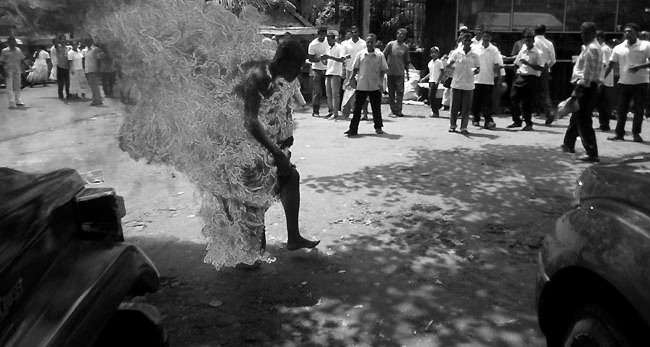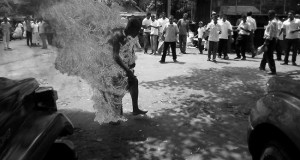J. S. Tissainayagam
The suicide by a Buddhist monk who set himself on fire in Sri Lanka to protest the slaughter of cattle has been hailed as an act of great self-sacrifice and compared to acts of self-immolation by Tibetan Buddhist monks protesting China’s repression in Tibet. Nothing could be more ill-informed. In fact, it is one more step by Sri Lanka’s chauvinist Sinhala-Buddhists to undermine the Muslim political base.
The monk, Bowatte Indraratne, who had been campaigning against the Muslim halal method of slaughtering animals, was also a politician. He was a former elected member of a local government body representing the extreme Buddhist political party Jathika Hela Urumaya (JHU). JHU’s leader Champika Ranawaka lost no time in exploiting the incident to advance the party’s agenda. He said the government should bring in legislation to ban the slaughter of cattle, and religious conversion. Christians have come under pressure from Buddhists for proselytising, a charge they deny.
A Sri Lankan Buddhist monk identified as Bowatte Indraratne walks after self immolating outside the sacred Temple of the Tooth in Kandy, Sri Lanka. Pic: AP.
The campaign to stop the slaughter of cattle and instances of violence against Muslims are not isolated events in Sri Lanka. These are steps to politically disempower Muslims are uncannily reminiscent of the way the Sinhala establishment tries to destroy the Tamil power base.
Persecution of Muslims is taking a particularly virulent form today. But in the past too Sinhala leaders viewed Muslims with suspicion, as they did Tamils. The control they exercised was a blend of coercion, political manipulation of Muslim elites and the policy of divide and rule.
Coercion of Muslims by Sinhalese was applied mostly through violence and intimidation. In recent memory are rampaging Sinhala mobs targeting Muslims in Mawanella (2001) and Beruwela (2002). Other disputes occurred over land, like Deegavapi in 1999.
Political manipulation of the Muslim elite compelled them to take decisions detrimental to their community. In 1956, Muslim politician and diplomat Sir Razik Fareed campaigned with Sinhala leaders to deny Tamil as an official language of the State, despite a large majority of Muslims being Tamil speakers.
Adopting a policy of divide-and-rule, Sinhala leaders forced Muslims – especially in the East – to view Tamils as enemies, which led to Tamil-Muslim clashes. The Sinhala-dominated military used Muslim home guards to target Tamil civilians in the East. The rift was magnified by the LTTE expelling the Muslim population in Sri Lanka’s North.
(READ MORE: Suu Kyi slams 2-child limit for Muslims in Burma)
With the military phase of the conflict with the Tamils coming to an end in May 2009, Sinhala-Buddhist nationalists realised they now had the luxury of investing more resources in suppressing Muslims. Further, with President Mahinda Rajapakse intent on consolidating power, extreme nationalism was a good vehicle.
The government has made no secret of its connections to extremist civil society groups. Relations between government officials and the principal vehicle of Buddhist bigotry, the Bodhu Bala Sena (BBS), are so fraternal that Gotabhaya Rajapakse, the hawkish head of the Ministry of Defence and brother of the country’s president, graced an important occasion of the organisation. The BBS plays a similar role as the Shiv Sena does to the pro-Hindu regimes in India.
As mentioned above, the objective of Sinhala-Buddhist nationalism is to demolish Muslim political power in Sri Lanka. It is no different from efforts to destroy the Tamil power base in the country from the 1950s. The three examples below demonstrate the similarities.
The BBS has opposed the certification of food as ‘halal’ and Muslim women wearing the hijab. These cultural practices are important markers of Muslim identity. The BBS’s campaign is not only to demolish what distinguishes this group’s identity, but also the power its members derive from that identity. For the Tamils, the primary marker of identity is language. That is why Sinhala nationalism sought to undermine Tamil by denying it official language status and placing obstacles to Tamil-speakers’ access to higher education and State employment.
Second, mosques and Muslim-owned businesses have come under assault. It is important to note the significance of both in the political lives of Muslims. The mosque is a forum for political mobilisation. The strength of metropolitan Muslims in Sri Lanka is their success as a merchant community. And they have used their wealth to buy political power. Therefore attacking mosques and commercial establishments is a way to undermine the Muslim power base. In the case of Tamils, assessing that their political base was territorial concentration in the country’s North and East, Sinhala leaders took to dismantling it by settling large numbers of Sinhalese in those areas.
Finally, let’s look at the government’s use of counterinsurgency laws to stifle freedom of speech and political opinion. On May 2, Azath Salley, a well-known Muslim leader, was arrested (and later released) under the Prevention of Terrorism Act (PTA). He was detained for an interview he gave to an Indian magazine where he said that Muslim youth should take to arms. But the reasons appear deeper than that. Salley openly criticised the government for anti-Muslim racism. But more than all else, Sally heads a political party which advocates Tamil-Muslim political dialogue to resolve mutually important issues. This, by definition, excludes government and the Sinhalese.
The government arresting and later releasing Salley is reminiscent of the then government criminalising Tamil parliamentarians who even advocated democratic secession. This legislation – the Sixth Amendment to Sri Lanka’s constitution – suppressed democratic dissent and left armed rebellion as the only option to give effect to Tamil demands.
Therefore, the self-immolation by Bowatte Indraratne protesting cattle slaughter had a sinister motive. It used religion as a weapon to undermine the political base of a minority community in Sri Lanka. If steps are not taken to check this trend, Sri Lanka’s Muslims could be facing a future of persecution and violence.
J. S. Tissainayagam, a former Sri Lankan political prisoner, was a Nieman Fellow in Journalism at Harvard and Reagan-Fascell Fellow at the National Endowment for Democracy in the United States.
AC

